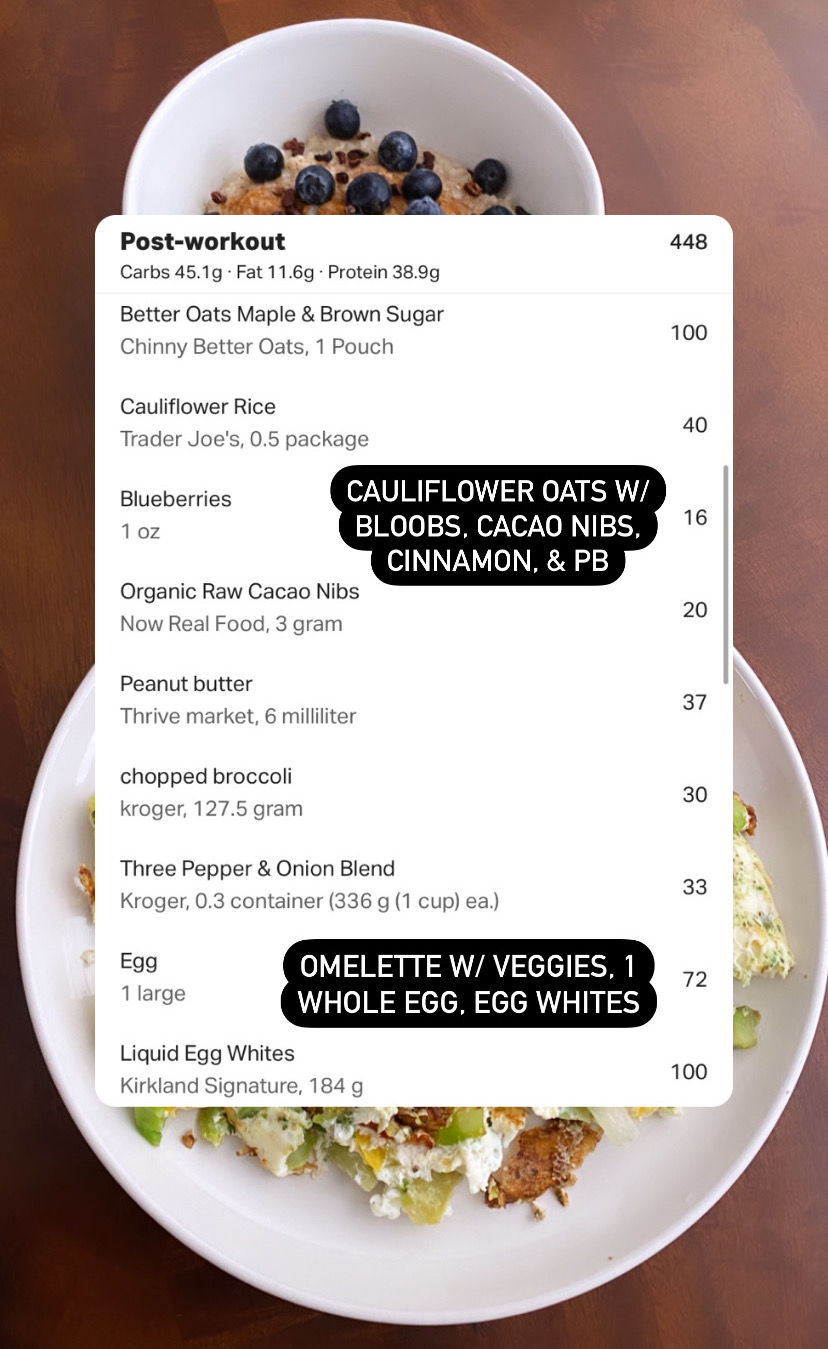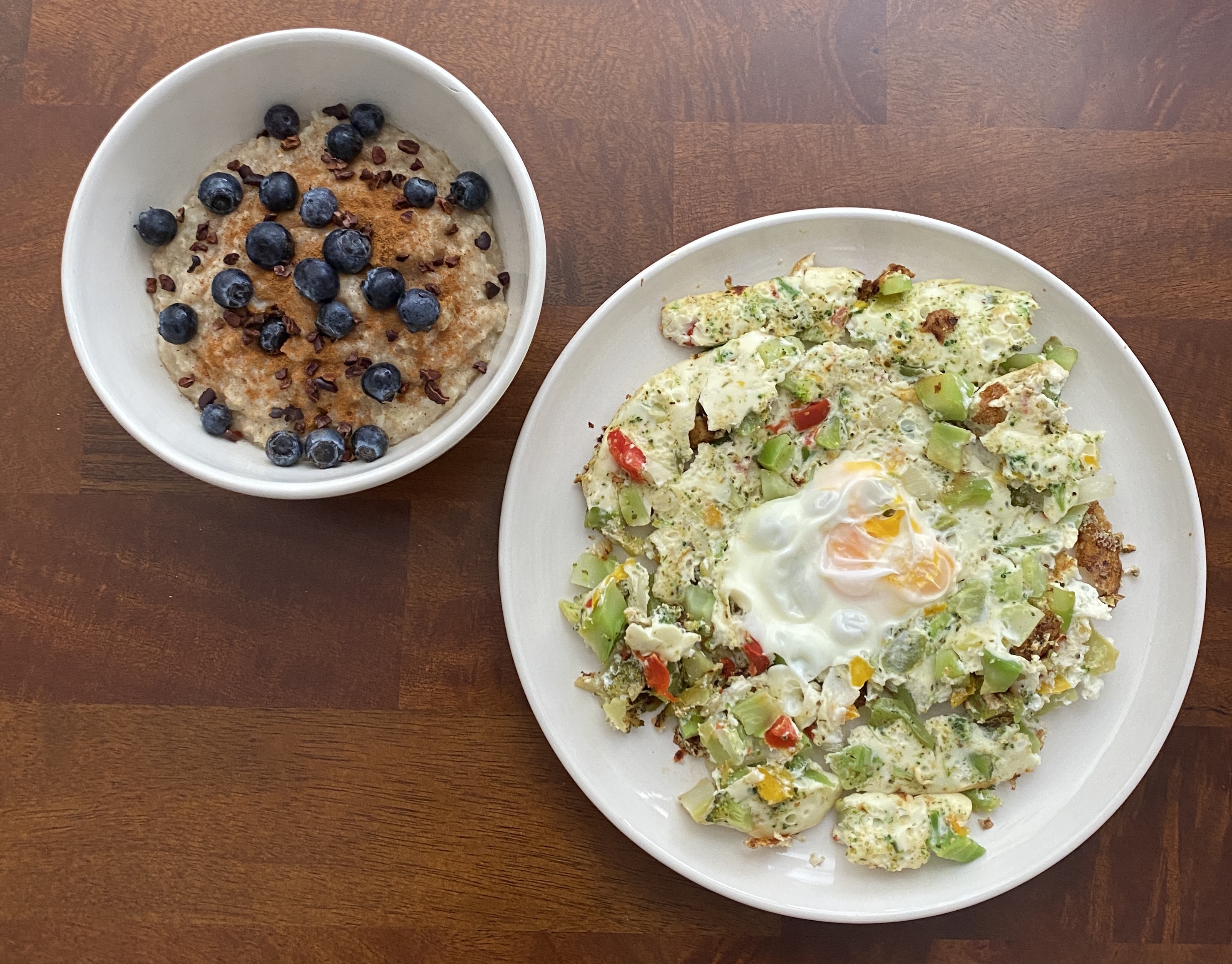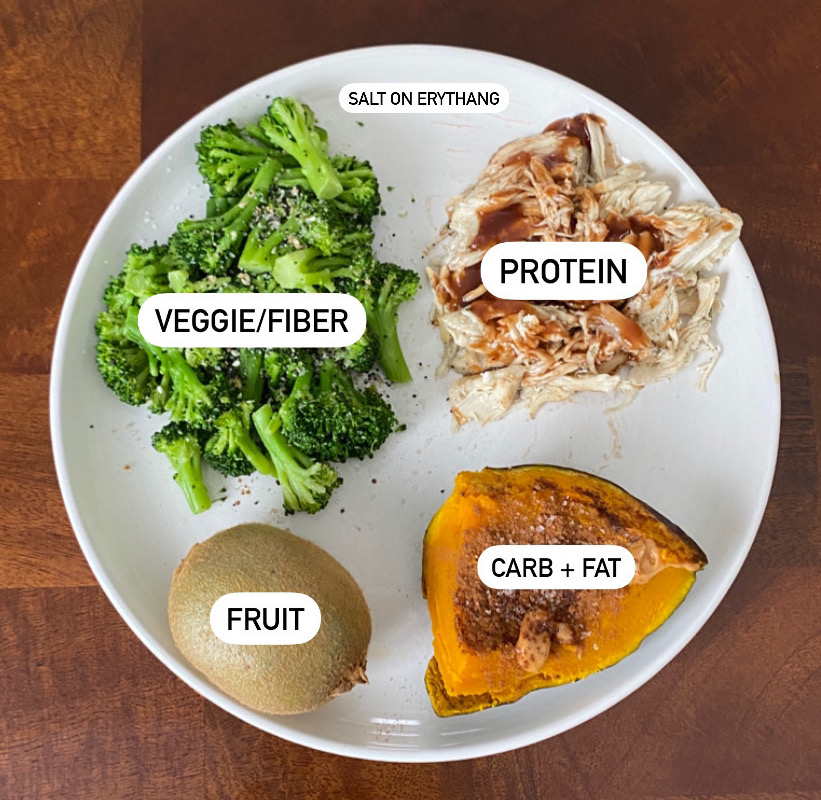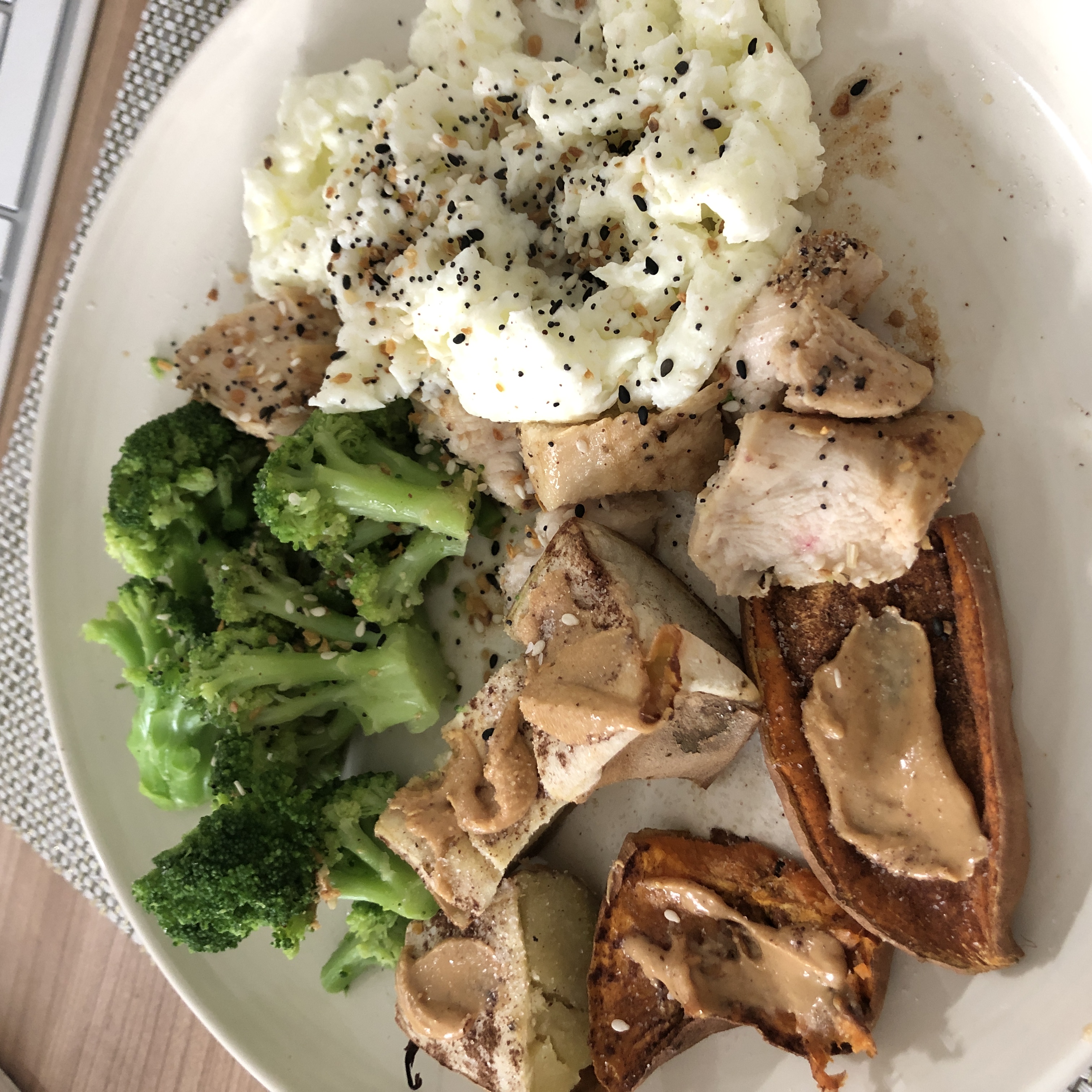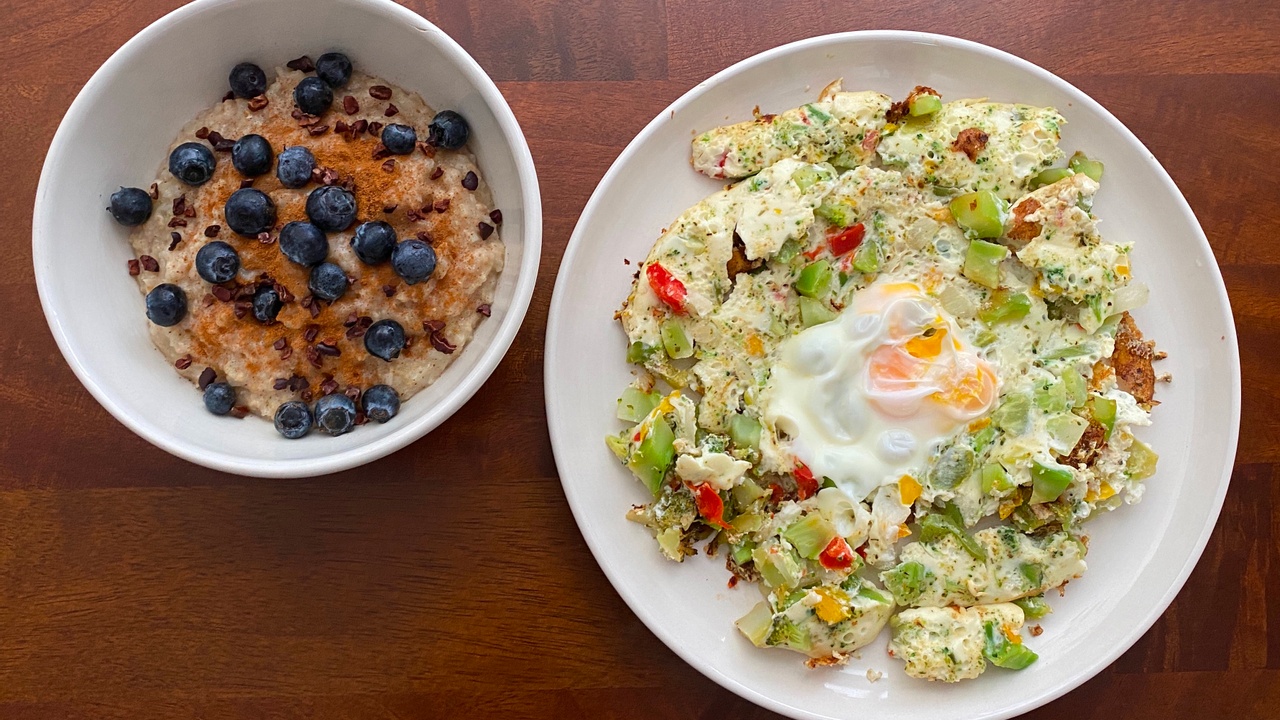
How to Optimize Your Post-Workout Meal for Maximum Recovery
Jun 24, 2021The primary goals of your post-workout meal are to:
- calm the nervous system AKA stress response from training
- get into a parasympathetic state (rest and digest mode)
- kick start the recovery process
- stimulate protein synthesis (making new proteins) and avoid a catabolic state (break down)
Post Workout Meal Timing Guidelines
Ideally 30-minutes to 2-3 hours after you finish your workout.
- If you went into your training session fasted, eat as soon as possible.
- If you ate a pre-workout meal, you're okay to wait longer (1-2 hours).
- It's probably a good idea to not let there be more than 3-5 hours between your pre-workout and post-workout meals.
*Note: You want enough time to get back into a parasympathetic state (~20-30 minutes post-workout) while also taking advantage of post-workout insulin sensitivity (more on this below).
Post-Workout Meal Macronutrients
Protein
For optimal muscle growth, we need to consider something called muscle protein synthesis (MPS). It’s basically the process of your body turning dietary protein into actual muscle tissue via protein ingestion and resistance training.
At the end of the day, it does mainly come down to making sure you're hitting your total daily protein target (more on that in this post: How Much Protein Should I Eat?).
But, if we're talking about optimization, the key is you want to plan and adjust the portion sizes for the protein in your meals to equal at least 25 grams or more. The sweet spot is generally 25-50 grams depending on your body size, personal digestion, and overall calorie goal.
The previous point also becomes even more important as we talk about something called the “leucine threshold.” Leucine is an amino acid that stimulates MPS and we need to consume a certain amount of protein in one sitting before we actually hit that threshold.
For most people, this threshold can be hit by consuming 25-50 grams of high-quality, animal-based protein. This threshold also goes up as we age (as muscle breakdown goes up), and is another reason why protein needs, in general, go up as we age.
So with all that being said, to maximally stimulate MPS throughout your day, it's probably most optimal to spread your protein intake across 4-6 meals/snacks, with 25-50 grams of protein at each (again, the amount will depend on your personal body size).
General rule
To optimize MPS and prevent as much muscle protein breakdown as possible, consume 25 to 50 grams of protein in your post-workout meal from a nutrient-dense, easily digestible, high leucine source like chicken breast, lean ground beef/turkey/chicken/pork, fish, egg whites, or protein powder.
Carbs
With carbs, insulin sensitivity is highest post-workout. Basically, your body will most efficiently use carbs for muscle-building purposes at this time. So it makes sense to time more fast-digesting carbs post-workout (e.g. white rice, potatoes, etc.).
THIS is probably the most important time to consume carbs, as far as timing goes because an intense training session will trigger a stress response. When you experience stress, cortisol (the stress hormone) rises and your nervous system enters a sympathetic state (also known as “fight-or-flight mode”).
In this state, your brain perceives a threat and slows other ‘bodily processes’ that are not vital to either “fighting or fleeing.” This means processes crucial to your recovery like food digestion, hormone production, and muscle growth itself are slowed down significantly.
So to optimize recovery, we want you to get out of a sympathetic state as fast as possible post-workout, and get into the parasympathetic or “rest and digest” state. This will allow your body to focus on nutrient absorption, repairing damaged tissues, etc.
Timing a majority of your carbs post-workout is advantageous because it can help decrease cortisol levels and again, this will help you create a better environment for recovery.
Remember though, it all comes back to YOU. The amount of carbs you consume post-workout is highly dependent on training time and personal goals throughout the rest of the day. For example, if you train early in the morning and know that having a large post-workout meal with carbs is going to hinder your focus and productivity at work or cause increased hunger/cravings throughout the rest of the day, then you need to play around with the amount that feels best for you personally.
General rule
Trying to get about half of your total carbs for the day pre and post-workout is typically a good rule of thumb for most (UNLESS it gets to the point where you're having trouble adhering or it doesn't work with your personal schedule). Timing your carbs in this way will give you a bit more energy pre-workout and kickstart recovery post-workout.
So depending on how many carbs you’re consuming during the day, just divide that in half and then divide that number in half one more time and sandwich those carbs pre/post-workout. For example, if you’re consuming 100 grams of carbs per day, 50 grams would ideally go to your peri-workout nutrition. So 25 grams pre and 25 grams post.
Combining a starchy carb source (i.e., potato, oats, rice, rice cake, etc.) and a fruit carb source (i.e., berries, kiwi, banana, apple, etc.) will potentially be more optimal for both quick and sustained energy.
Fat
You don’t want fat too low or too high in your post-workout meal for a few reasons. If it’s too high, it could slow your body's ability to digest the nutrients you just took in from protein/carbs.
However, this goes in both directions because having too little fat can also hinder nutrient absorption.
So, keeping fat intake between 5 to 30 grams post-workout is probably a good place to be for most. The more calories you have to work with, the higher the end of the range you’ll be on.
General rule
5 to 30 grams from high-quality fat sources like avocado, olive oil, coconut oil, butter, ghee, nuts and seeds, nut butter, etc.
Salt
Sodium/salt helps with nutrient absorption which is of course what we want to optimize post-workout.
Here are just a few reasons why sodium is important to pay attention to:
- Increases blood flow
- Sodium consumption causes increased blood volume and has the ability to draw water into your bloodstream. When there's extra sodium in your bloodstream, it pulls water into your blood vessels, increasing the total amount (volume) of blood inside your blood vessels which increases blood flow.
- Gives you a great pump
- Sodium pulls water into your cells, including your muscle cells, causing them to expand and give you a great pump.
- Balances electrical charge in your body
- Sodium is essential for the maintenance of membrane potential, which affects muscle contraction and cardiac function.
- Balances electrolytes
- As one of the main electrolytes in the human body, sodium intake greatly influences electrolyte balance and helps to spare the loss of other electrolytes (magnesium & potassium)
- Influence nutrient absorption and transport
- Sodium influences the uptake and absorption of nutrients such as amino acids, glucose, and water.
General rule
Add ¼-½ teaspoon salt to your post-workout meal.
Post-Workout Meal Example
1. ~30-40 grams Animal-Based Protein
Usually a lean meat source or eggs/egg whites. Enough to sufficiently elevate MPS (muscle protein synthesis) by providing ample leucine and other amino acids +high bioavailability (easy to absorb)
✔️ In this meal: egg whites (you can also add protein powder to oatmeal for more flavor & protein)
2. ~30-50 grams Starchier Carbs & Fruit
I try to distribute my carbs across the day so ~50%+ are allocated to peri-workout (pre&post) to fuel training & kickstart recovery. Combining starchier carbs with fruit carbs allows you to take advantage of faster & slower + multiple absorption pathways in the body via both glucose & fructose.
✔️ In this meal: Oats, blueberries.
3. ~10-20 grams Quality Fat
I try to keep fat intake on the lower side peri-workout because it does slow digestion quite a bit & I like to consume more fat in my meals further away from the workout. However, you DO want some fat to ensure you’re keeping blood sugar/energy levels stable during/after training.
✔️ In this meal: Egg yolk in omelette, peanut butter, and cacao nibs on oatmeal.
4. Veggies/Fiber
I’ve always been a ‘volume eater’ and having an adequate amount of veggies/fiber helps me feel full and satisfied. I added cauliflower rice to my oats for more volume (you can’t even taste it, I promise!)
✔️ In this meal: Cauliflower rice in oats, broccoli & peppers in omelette
5. Salt
Sodium is SUPER important both pre&post workout. It ensures proper electrolyte balance & blood flow, gives you a great pump, and enhances the absorption of nutrients from the foods you’re consuming.
✔️ ¼-½ teaspoon high-quality salt on everything
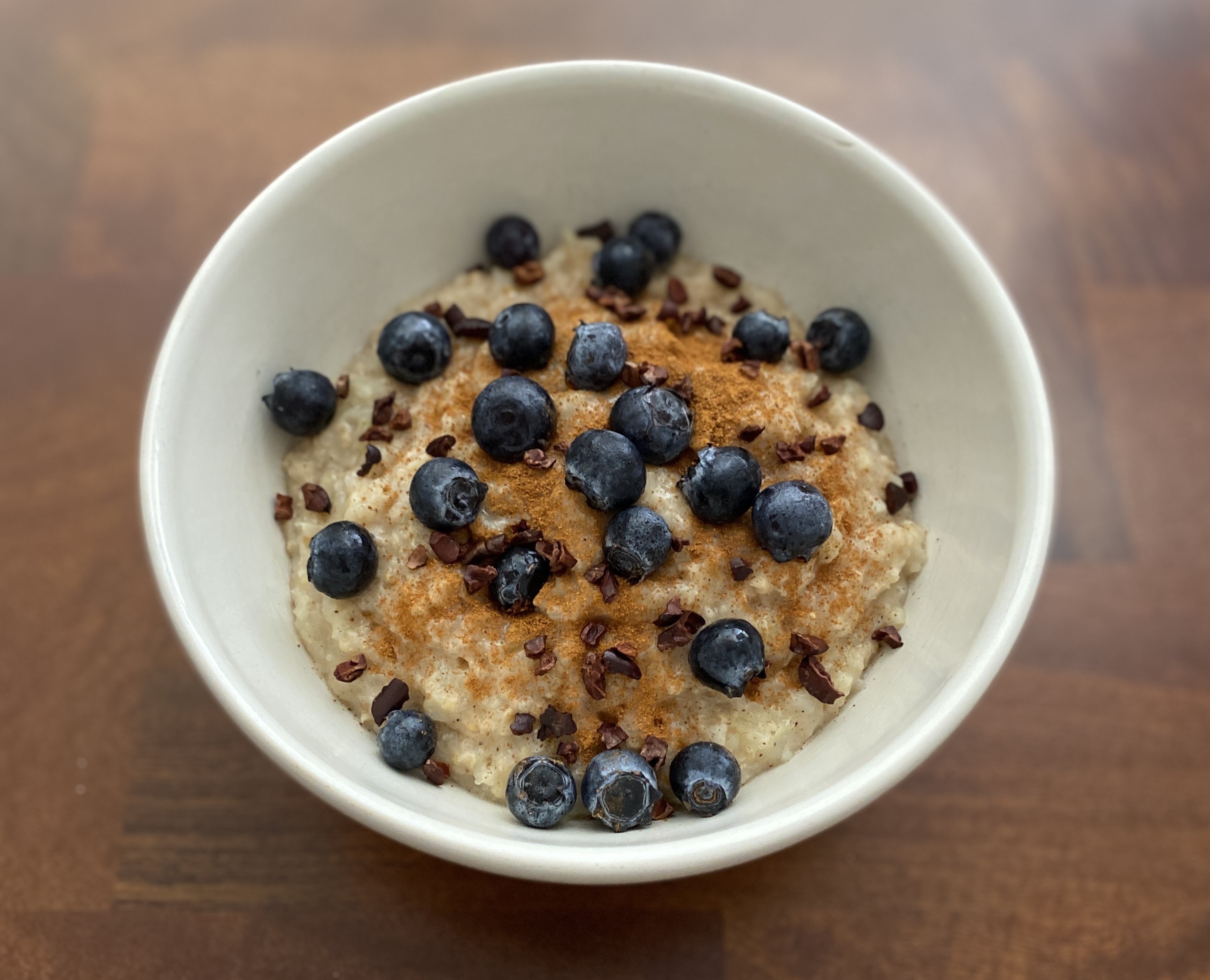
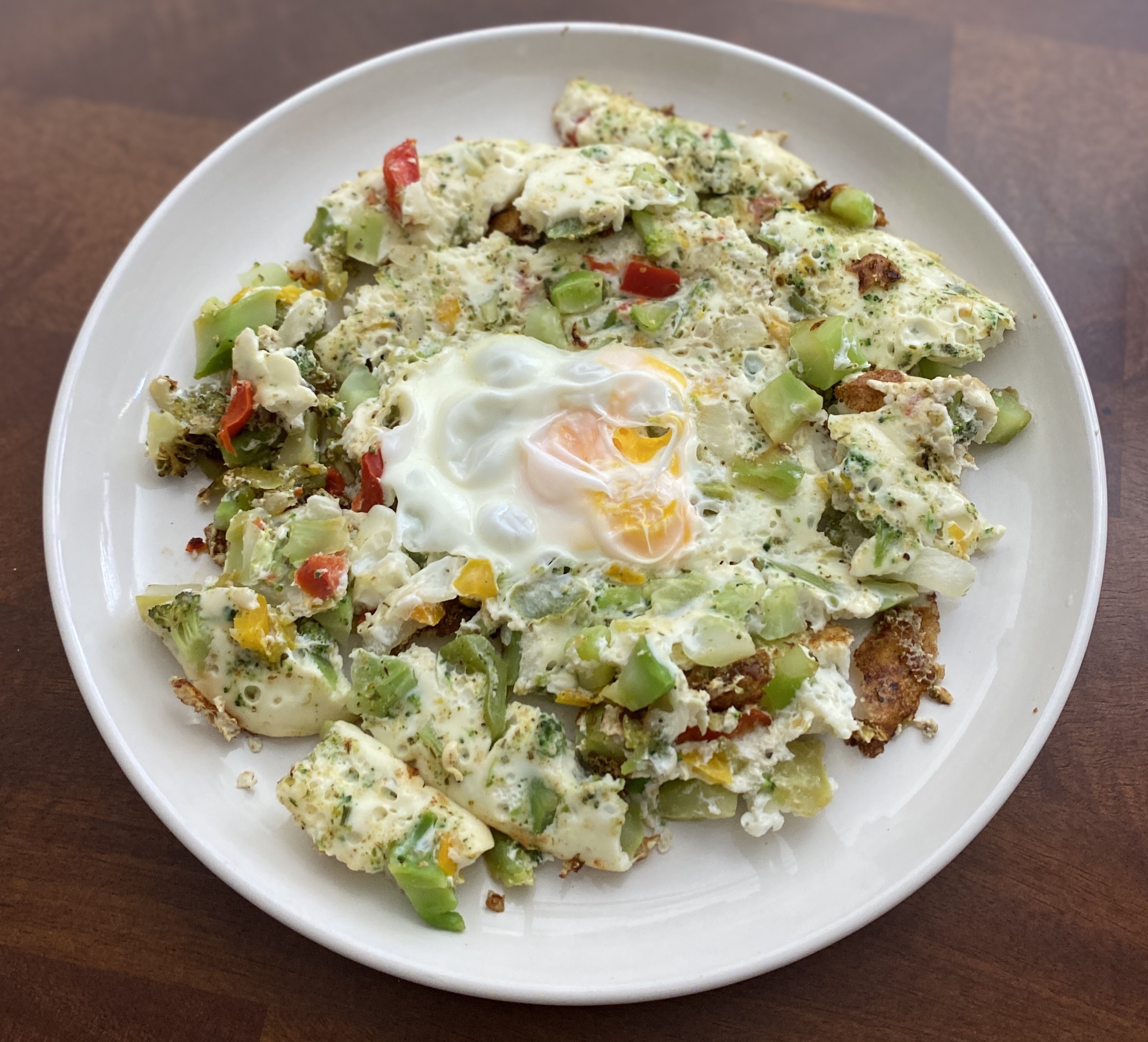
Quick Overview of Building Post-Workout Meals
- #1 Focus - Protein!
- 25-50 grams (minimum to maximum muscle protein synthesis range - size dependent)
- choose nutrient-dense, easily digestible, animal-based if possible
- chicken, eggs, beef, fish, etc.
- Faster-Digesting Carbs
- 1/4 of your daily carb allotment
- potatoes, oats, white rice, squash, fruit, etc.
- your body is more insulin sensitive post-workout and is primed to use carbs to replenish muscle glycogen
- faster-digesting carbs spike insulin and blunt cortisol, helping to shift you into a more parasympathetic state and aid recovery.
- 1/4 of your daily carb allotment
- Volume Veggies
- As desired. But be cautious of adding too much because a lot of fiber can slow digestion down and cause GI distress for some.
- High-Quality Fats
- 5-30 grams
- avocado, olive oil, coconut oil, butter, ghee, nuts and seeds, nut butter, etc.
- 5-30 grams
- Don't forget the salt!
- ¼-½ teaspoon high-quality salt
- sodium helps influence the absorption of nutrients
- ¼-½ teaspoon high-quality salt
- Overall Timing
- The meals around your workout are ideally high protein, high-er carb, and low-er fat.
- The meals further from your workout are still high protein, but higher fat and lower carb.
I hope this helps you to build your own post-workout meal! If you need further guidance with your personal nutrition and/or training protocols, check out my programs HERE.
Other Post-workout Meals You Can Make
Shredded chicken with sugar-free barbeque sauce, steamed broccoli with everything but the bagel seasoning, kabocha squash with peanut butter and cinnamon, kiwi, salt.
Shredded chicken and steamed broccoli, smashed/air-fried golden potatoes with cheddar cheese, salt.
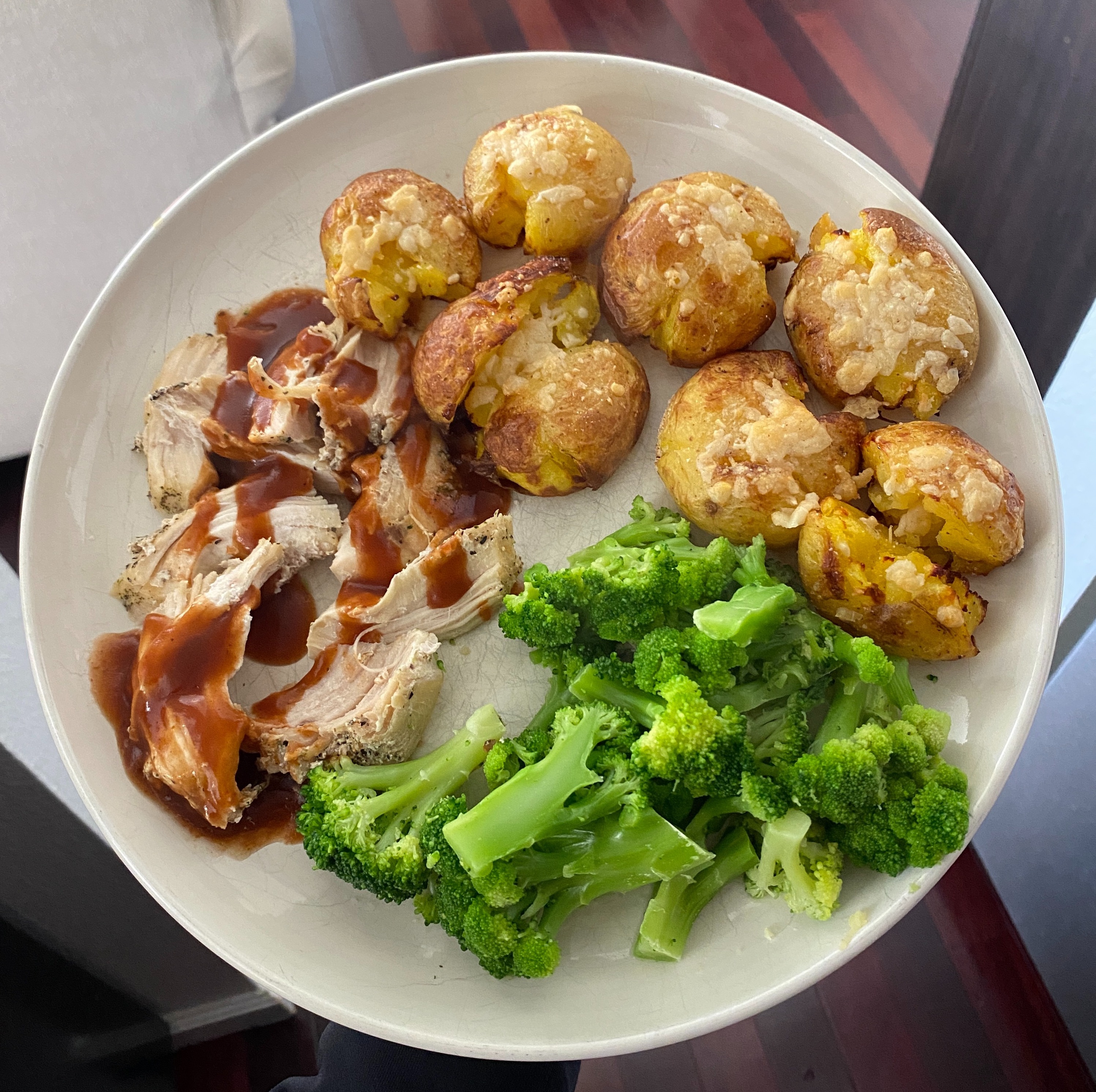
Shredded pork loin with sugar-free barbeque sauce, cauliflower rice and bell pepper saute, kabocha squash with peanut butter, salt.
Shredded chicken and steamed broccoli with everything but the bagel seasoning, kabocha squash with peanut butter and cinnamon, salt, berries on the side (not shown).

Chicken breast, steamed brussel sprouts, purple sweet potatoes with peanut butter, salt.
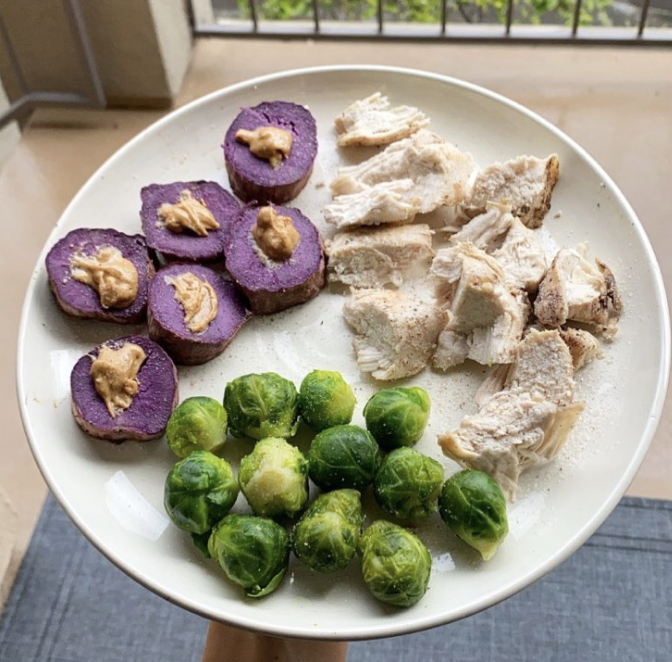
Egg whites, chicken breast, and broccoli with everything but the bagel seasoning, sweet potatoes with almond butter, salt.
Roasted pork loin, steamed vegetable medley, kabocha squash with peanut butter and cinnamon, salt.
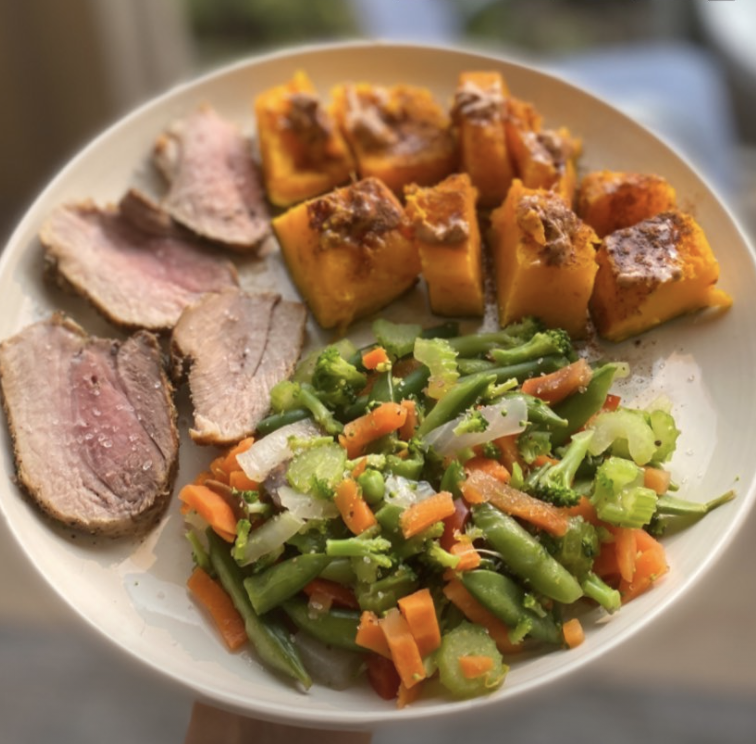
Ready to join a group of strong, confident, badass women?
Don't miss a beat!
Get my weekly tips, exercises, recipes, and more fun stuff to your inbox every Friday.
Your information is safe.

